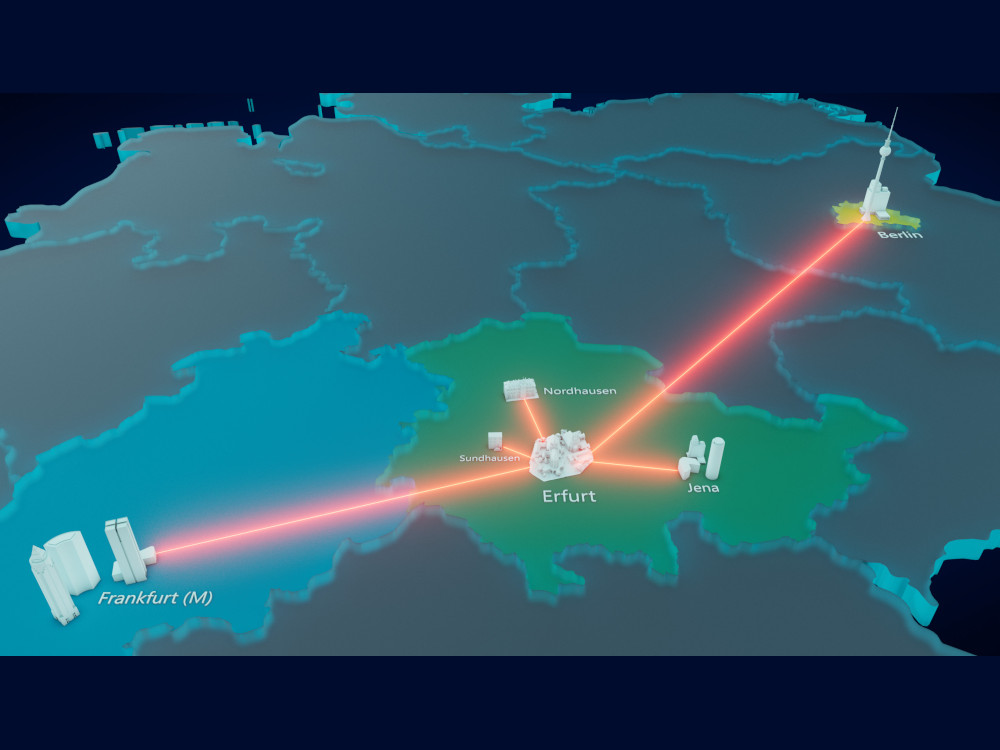
11 Sep Erfurt: new hub for quantum communication
With various projects, the state, federal government and the European Union are driving forward the expansion of a network for quantum communication in Germany. The German state Thuringia aims to become an important hub for the German quantum network.
New fiber links for quantum communication
On August 31, 2023, Thuringia’s Science Minister Wolfgang Tiefensee visited the Fraunhofer Center in Erfurt to review the progress of existing research projects and to give the go-ahead for the expansion of the quantum communications network in Germany.
With funding from the state, a fiber optic test track has already been established between the Fraunhofer Institute for Applied Optics and Precision Engineering IOF in Jena and the Fraunhofer Center in Erfurt. Here, quantum keys have already been successfully exchanged between the two cities over a distance of 75 kilometers – as part of the QuNET initiative funded by the German Federal Ministry of Education and Research (BMBF). The special feature here is that it was possible to use an existing infrastructure of conventional telecommunications optical fibers for the test route. According to the partners, the current subject of research is how the new systems for quantum key distribution can be integrated into these existing networks and made usable for various fields of application.
Network to Berlin and Frankfurt am Main in the future
The expansion of the test route is now progressing further: The Thuringian communities of Nordhausen and Sundhausen will be connected to the existing link between Jena and Erfurt by 2024. Furthermore, within Jena, the university hospital will also be connected to the test track. This will extend the fiber-based test route to a total length of more than 150 km. By the end of 2024, further sections are planned as far as Berlin and Frankfurt am Main. The hub of this network will be the Fraunhofer Center in Erfurt. The network expansion and the associated development of strategic cooperation in the field of communications and information technology are taking place as part of a new research project called Q-net-Q.
Application: Secure exchange of patient data
In the Q-net-Q project, under the leadership of Nordhausen University of Applied Sciences and with the participation of the Fraunhofer IOF, the application potential of highly secure quantum communication for telemedical software will initially be tested as an example. The guiding idea behind this: Often, especially rural regions suffer from a severe shortage of specialists and general practitioners. A faster and more confidential exchange of patient data between urban and rural areas could therefore not only make medical care more convenient and efficient in the future, but could even save lives in cases of doubt, according to the researchers’ motivation.
With this in mind, the Thuringian community of Sundhausen will also be connected to the new fiber optic test route as an example of a rural region. The first concrete use cases for the new section of the route between Sundhausen and Jena University Hospital are to be in the area of follow-up care for post-Covid patients, for example a post-stationary hospital stay, on the one hand, and in early neurological detection using digital tests, for example in dementia detection, on the other.
High-speed connections between data centers
Research at the further planned sections of the route to Berlin and Frankfurt am Main will focus on the exchange of data between data centers and high-speed connections. “Within the framework of the Q-net-Q project, we want to fundamentally research how the physically securely generated quantum connections from QKD systems can be efficiently integrated in today’s Internet to secure communication paths,” says Professor Thomas Hühn from Nordhausen University of Applied Sciences, explaining the overall project goal.
The Q-net-Q project is being implemented as part of the European program EuroQCI. The EU and the BMBF are funding the project with a total of 11.8 million euros, according to their information. In addition to the Fraunhofer IOF and the Nordhausen University of Applied Sciences, which is acting as consortium leader, the Q-net-Q research association includes five other academic partners: the Technical University of Munich, the Technical University of Berlin, the Friedrich Alexander University of Erlangen-Nuremberg and the Fraunhofer Institute for Telecommunications, Heinrich Hertz Institute, HHI. Furthermore, two industrial partners, Utimaco and DE-CIX Management, are also involved in the project.
Source and image: www.iof.fraunhofer.de






